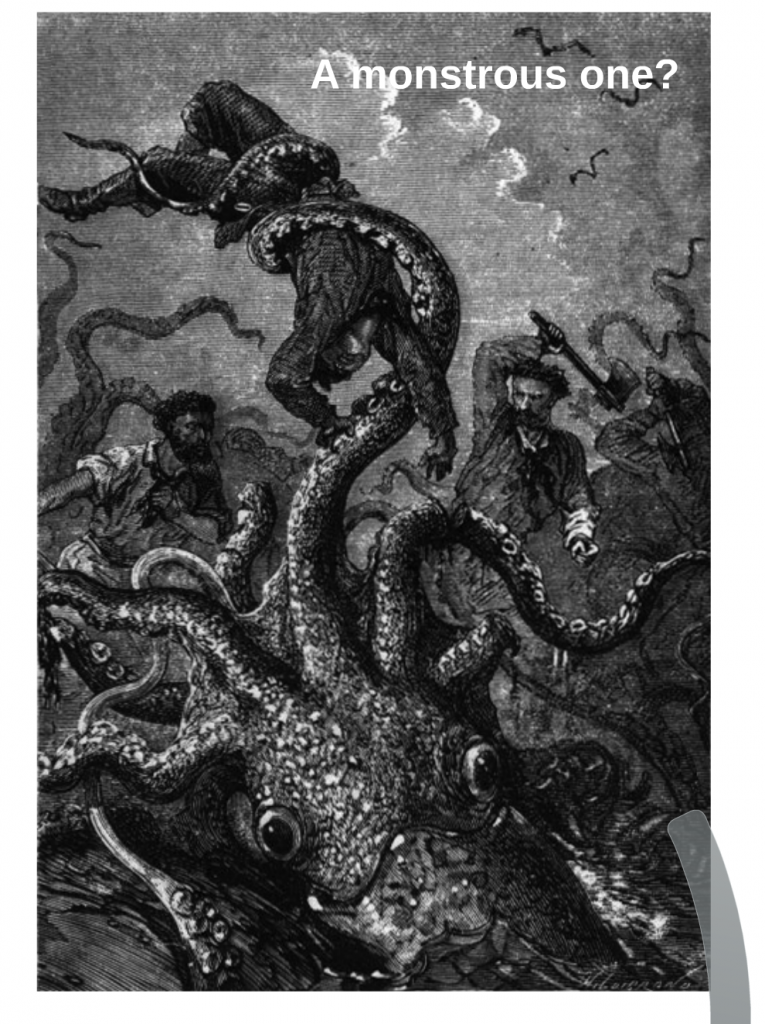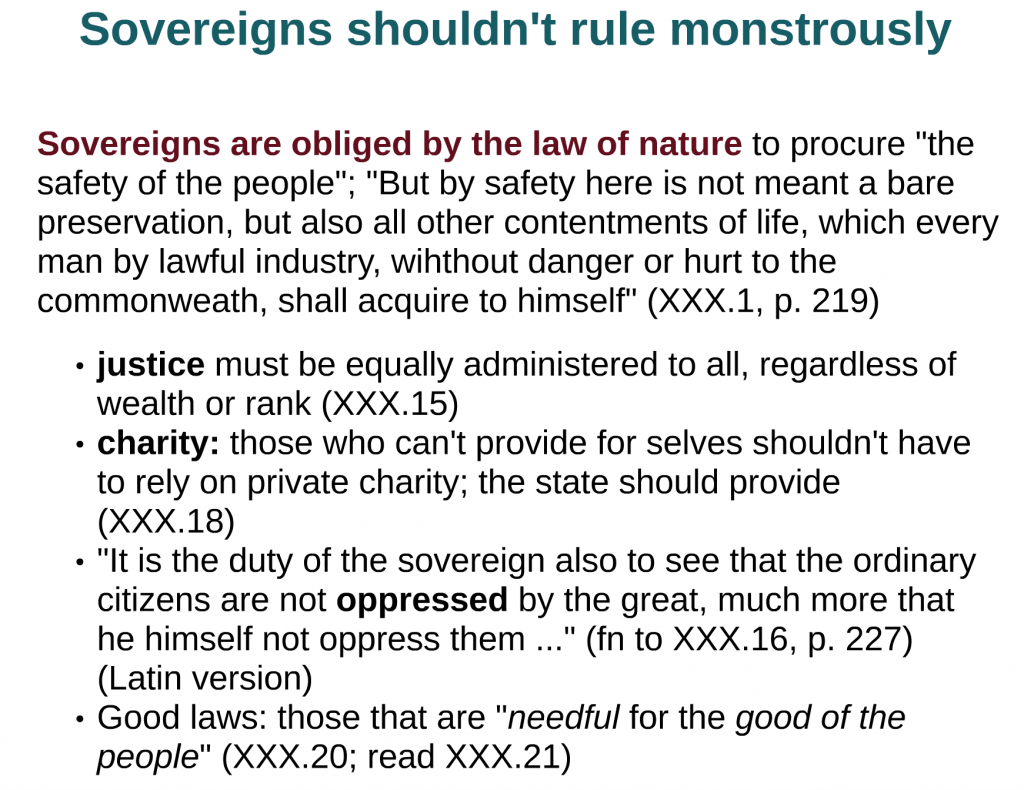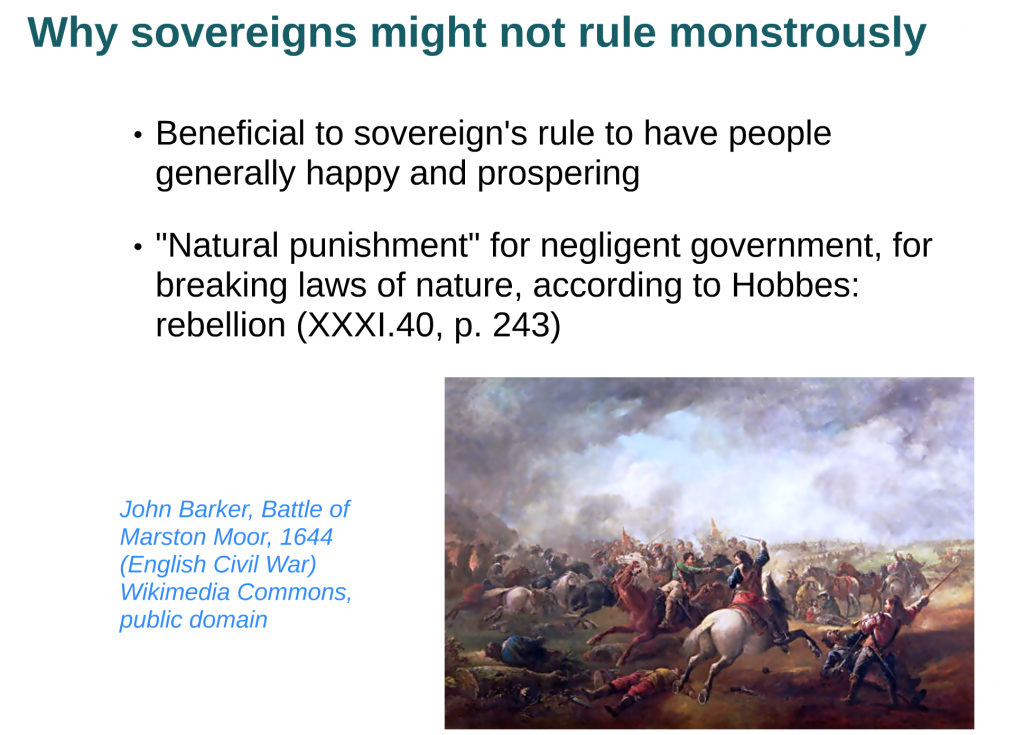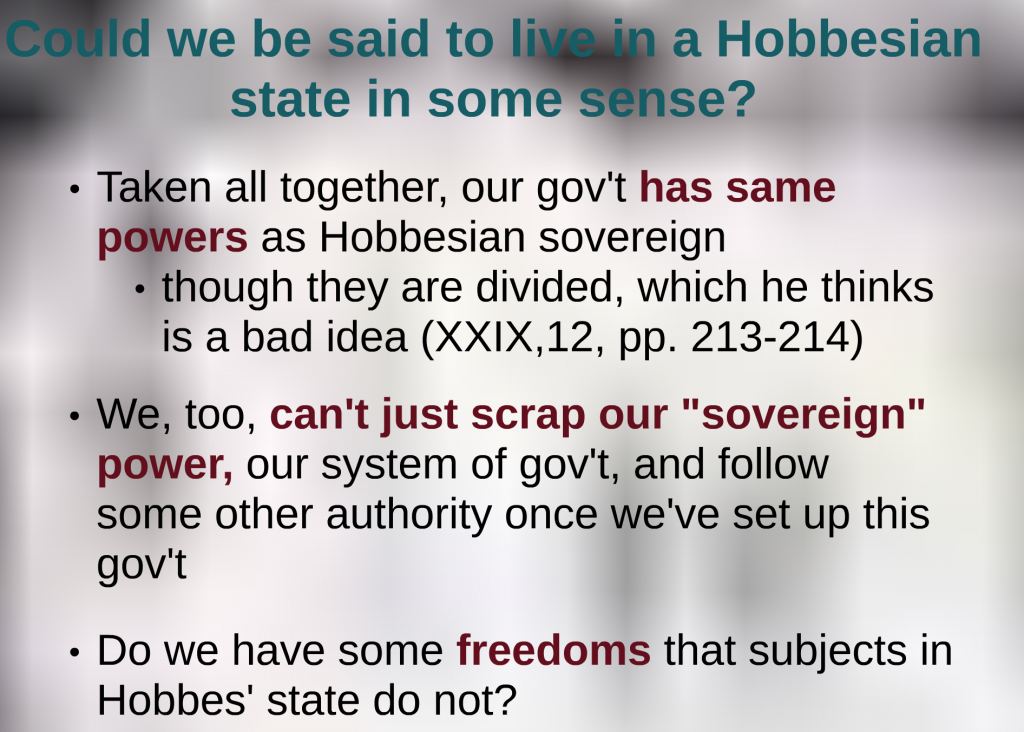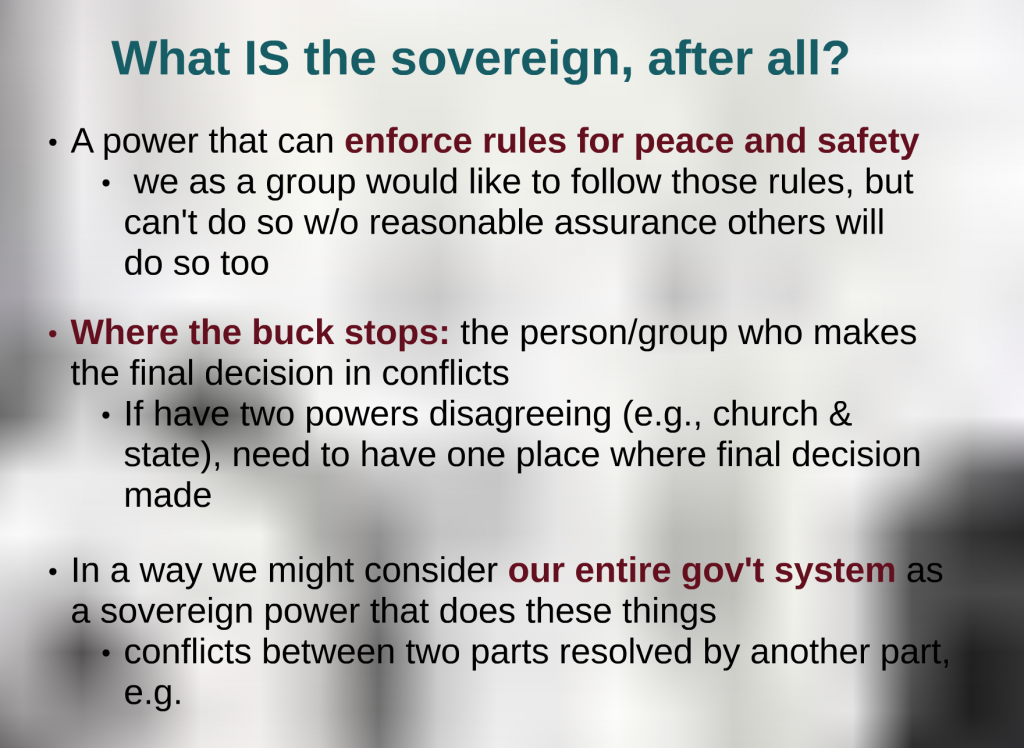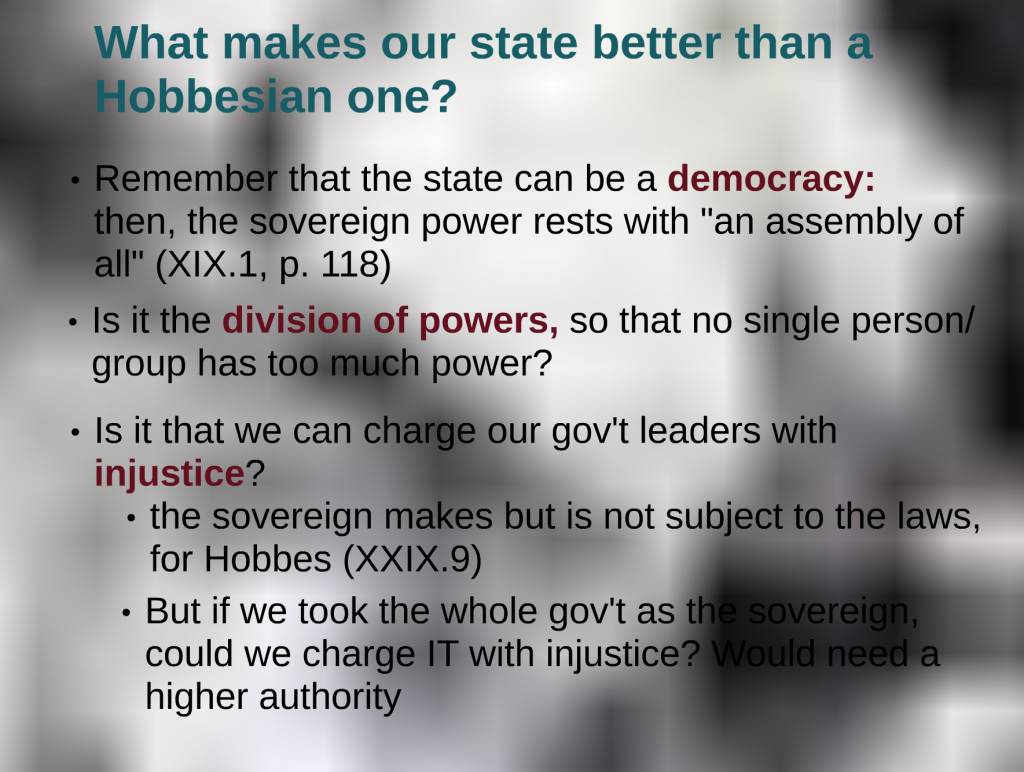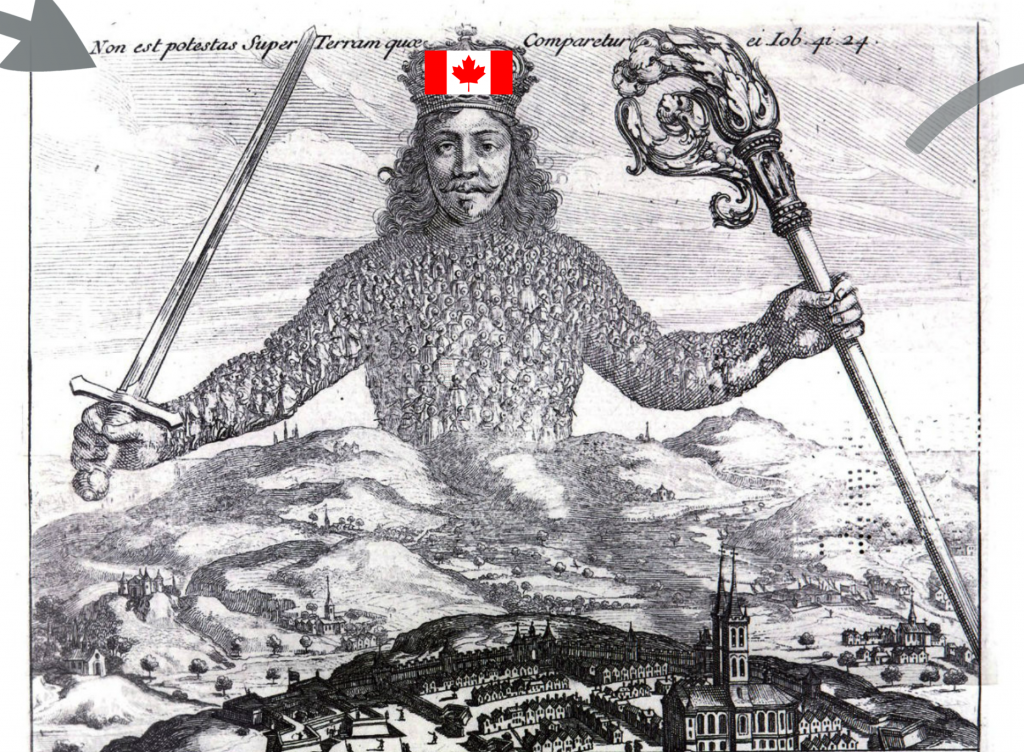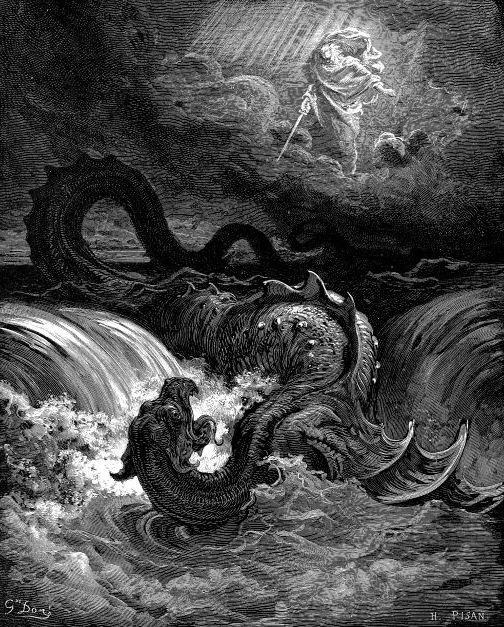
Destruction of Leviathan, engraving by Gustav Doré (1865). In the public domain. Accessed from Wikimedia Commons.
No, I don’t mean which laws of nature does he list–that’s easy. The first two, in Chapter 14, state:
1. Everyone should “endeavour peace” when it is possible to attain; if not, we can engage in “war.”
2. We should be willing to transfer our natural right to all things in the state of nature to a sovereign power, when others are willing to do so too, for the sake of peace and defense of our security.
Then there are 17 more in Chapter 15, saying things such as: we should keep our covenants (so long as there is a common power to enforce them), we should pardon past offences by those who repent of them, acknowledge equality of persons, treat people impartially when judging disputes, and more.
My question is: What sort of things are these laws? What does it mean to say they are laws of nature?
Different ways of thinking about what “laws” are
One way to think about “laws of nature” is to imagine them like physical laws, like the laws of motion. If Hobbes’ laws of nature were like this then it would seem they would describe how people just naturally act; they would be laws in the sense of descriptions of universal regularities of human action.
But it’s pretty clear that Hobbes’ laws of nature are not simply descriptions of how humans always or usually act. What comes closer to that sort of thing are statements he says about our common desires and aversions, as discussed on Monday–things like desire for power (“one’s present means to obtain some future apparent good” (Chapter 1, Sect. 1, p. 50), or fear of death.
Another way of thinking of “laws” is as rules created by an authority, such as a governmental authority (civil laws) or the commandments of God. Are the laws of nature laws in that sense? Turns out Hobbes says yes, that we can think of them as “delivered in the word of God, that by right commandeth all things” (Chapter 15, sect. 41, p. 100). So then, all these things we should do would be commandments given to us by God.
“general rule[s], found out by reason”
But Hobbes actually talks about laws of nature in quite a different way than this, most of the time. In his lecture on Hobbes, Robert Crawford pointed out that there is a difference between thinking of “natural law” (which can be considered as a commandment by God) and “laws of nature”–the latter being instead “precepts determined by reason” (from my notes on the lecture).
Here’s how Hobbes defines a law of nature: “a precept or general rule, found out by reason, by which a man is forbidden to do that which is destructive of his life, or taketh away the means of preserving the same; and to omit that, by which he thinketh it may be best preserved” (Chapter 14, sect. 3, p. 79). So here, it sounds like we can use our reason to determine that we ought to do whatever we can to preserve ourselves.
But that doesn’t sound all that different from thinking of laws of nature as what we naturally tend to do, because, as noted above, we already do tend to naturally seek to preserve ourselves. So what gives?
Articles of peace that protect people “in multitudes”
Hobbes also calls the laws of nature “articles of peace,” suggested by reason, by which people can live together well in groups without falling into a state of war (Chapter 13, sect. 14, p. 78): “These are the laws of nature dictating peace for a means of conservation of men in multitudes” (Chapter 15, sect. 34, p. 99).
Here is where things start to get clearer for me. For Hobbes, people naturally tend to seek their own preservation and the power to be able to attain that which they consider good, but when we live together with others (or even near them) our natural desires and aversions lead us into conflict (the “state of war”). We don’t naturally and automatically coordinate our efforts so as to achieve the best outcome for all of us. Hobbes says that we are not like bees or ants, who can live sociably together naturally (Chapter 17, sect. 6, p. 108).
We need to use our reason to determine what rules we should follow to make living with others in groups something that conduces to our own individual desires for self-preservation and the means to fulfill our desires now and in the future. So, for example, reason can tell us that the laws of nature numbers 2-19 should be followed in order to promote peaceful living in groups. The first law of nature is something we can determine by reason too–if we live in a group with others, what would really be best for us is to seek peace, because that’s going to allow us to achieve our natural desires best. But if it’s not possible, do the next best thing–whatever you need to to survive and defend what you have, namely war.
Best and worst outcomes
I had this on the board in seminar today, but we didn’t get a chance to talk about it.
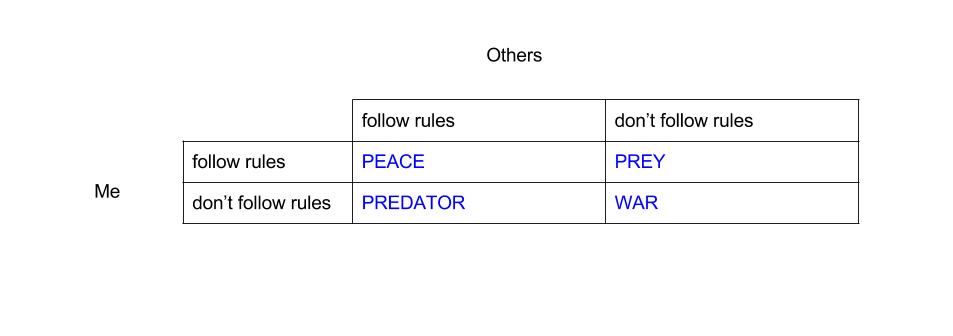 This is meant to show that in the state of nature, even if we want to try to work together with others, come together in social groups to cooperate rather than engage in conflict and war, it doesn’t actually make rational sense to do so. We can try to work together in groups by coming up with rules that we should all follow, but it only makes sense to follow such rules if we can be reasonably assured others will too. That would be the state of “peace.” That, for Hobbes, is the best outcome.
This is meant to show that in the state of nature, even if we want to try to work together with others, come together in social groups to cooperate rather than engage in conflict and war, it doesn’t actually make rational sense to do so. We can try to work together in groups by coming up with rules that we should all follow, but it only makes sense to follow such rules if we can be reasonably assured others will too. That would be the state of “peace.” That, for Hobbes, is the best outcome.
The worst outcome is being “prey”–when I follow rules and most others don’t: “he that should be modest and tractable, and perform all he promises, in such a time and place where no man else should do so, should but make himself a prey to others, and procure his own certain ruin, contrary to the ground of all laws of nature, which tend to nature’s preservation” (Chapter 15, sect. 36, p. 99). In this quote Hobbes is saying it’s stupid to follow the laws of nature when there’s no assurance that others will too.
But without a common power to enforce rules, we don’t have reasonable assurance that others will follow them. So to avoid the worst outcome (prey) it makes sense to engage in conflict, trying to take what others have, avoiding any rules except “do whatever is necessary for your own preservation” (not a quote from Hobbes). This means either being a predator or engaging in war, though since most other people will recognize that they too should do whatever is necessary to preserve themselves, the most likely outcome is war.
This diagram also explains the first law of nature: we should seek peace if we can (it’s the best outcome), but if we can’t, it makes the most sense for our own self-preservation to engage in war.
Back to just what the heck laws of nature are
Naturally, when we live with or near other people, we are going to end up in war. That’s the rational choice. But reason also gives us another option: it suggests “articles of peace,” rules we should follow to achieve peace. The first step is to set up a state with a sovereign (the second law of nature), and then to follow the 3rd through 19th laws of nature once in that state, since these will promote peace (according to Hobbes).
So the laws of nature are not just how we naturally always act. If we were bees or ants we would naturally work together in groups in a way that would promote peace. But we need reason to tell us a set of rules that we should follow in order to achieve this, because if left on our own we will end up in war.
But in what sense are they also commandments of God? Assuming for the moment that Hobbes isn’t an atheist, one can think of this in at least two ways: (1) God commands us to seek peace because it’s a good thing according to God, or (2) God created the earth and humans and therefore created the conditions required for promoting peace. He created us to desire to preserve ourselves, and doing so is good according to our desires.
Well, that’s certainly plenty and probably too much for one blog post! It’s as long as many of the Arts One essays!
